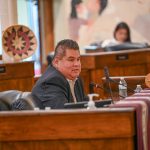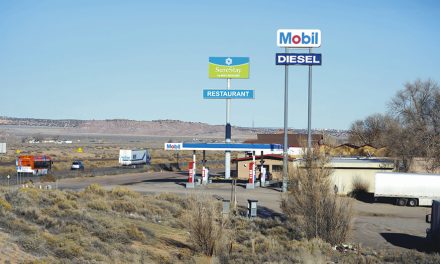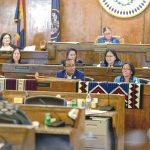
Letters: Healthier foods needed at local convenient stores

Shopping at a gas station or convenience store on the Navajo Nation, you are bombarded with stacks of soda, chips and other junk food that are “on sale” as soon as you walk in. With the enactment of the Healthy Diné Nation Act of 2014, the Navajo Nation needs to encourage storeowners and other local businesses to supply healthier food for the communities they serve.
The store layout affects a customer’s willingness to buy, so storeowners strategically place items in their stores in specific areas to generate more sales. The store environment is so important to businessowners, their sales and profitability depend on it. Unfortunately, for the customers, this means we will buy soda simply because it was placed in the front of the store. Signage also plays a huge role in boosting sales, for instance, there are many of promotional and sale signs for soda throughout the store. These marketing strategies have been effective, imagine if the store owners and managers used those same strategies to sell healthy food.
Although I sympathize with the storeowners, I would like to see them take a stronger initiative in creating a healthier environment within their stores. For instance, they could supply more fresh produce, lean meat, whole grains, water and canned food (i.e. packed in water, packed in 100 percent natural juice, low sodium, no sugar added, etc.). To encourage the storeowners and managers, the Navajo Nation could incentivize those stores that make an effort to supply healthy food. The incentives could include, decreasing expenses (such as taxes and other business fees) for storeowners and by providing them with resources to move towards supplying healthier options. Public health entities across Arizona and Navajo Nation could also help storeowners transform their stores by providing education and training to employees.
It is imperative that we as Diné people work together to provide a healthy environment for our children. This is a great opportunity for stores across the Navajo Nation to make healthy food accessible and affordable for the people. By improving our stores, we could eliminate the food desert crisis and health disparities that plague the Navajo Nation.
Jamie Wilson
Tonalea, Ariz.
Article says 8 in every 10 Native adults are overweight, obese
The Arizona Daily Sun recently published an article titled, “Tribal Obesity in Arizona Most Severe in Nation.” According to the article, approximately 8 of every 10 Native adults in Arizona are either overweight or obese. Although devastating, this information comes at an opportune time for the Navajo Nation: one year after a multi-million dollar settlement with the federal government. The health of our people should be the number one priority when deciding how this money should be spent.
Why not use these funds to minimize barriers to healthy living?
Increase access to healthy foods by supporting local farmers and teaching people how to grow their own food. Provide incentives for local businesses and gas stations to provide healthy, fresh food options. Support mobile farmer’s markets and mandate that larger grocery franchises provide a larger fresh produce selection. Establish school gardens and provide home garden “starter kits” for students and their families. Support primary and lower elementary school sports and physical education programs.
Make exercising safe by putting up streetlights and separate lanes for runners, bikers and walkers. Create trails between community landmarks so that people are motivated to walk, run, or bike. Create and enforce dog ordinances so that people can feel safe enough to walk, run, or bike ride near their homes. Ensure that all health promotion facilities are fully functioning and accessible to the public. The list of obesity prevention opportunities is endless.
I attended two settlement public forums last year and immediately noticed that the preliminary funding plan did not prioritize diabetes and obesity prevention. I realize that such a large sum of money will draw an equally large number of competing interests. But what is more important than the health of our people? Aren’t these investments worth the risk?
Jennifer Richards
Tucson, Ariz.
(Hometown: Tuba City, Ariz.)
Still waiting to hear from Prez and VP
Now that the honeymoon is over, allow me to express some constructive criticism against the Begaye-Nez administration. In the real world, or in a more professional setting, one would think the new president and vice president would be unyielding to creating the most open and accessible administration, but unfortunately that has not been the case.
On July 21, 2015, as a Navajo contingent, registered voter, and veteran, I sent letters to President Russell Begaye and Vice President Jonathan Nez, courtesy copies to their respective appointees. I have patiently waited for a reply from either of these “leaders” or their staff. To date, I have not received any form of correspondence, a call, fax, or email. My letters to both the Navajo Nation president and vice president addressed concerns over what I called “perpetual deficiencies” that continue to vex Navajo Nation government. My concerns, however, were more on a personal experience as it pertains to entrenched policies and personnel involving employment practices and academic research support.
Since my professional correspondence to the Office of Navajo Nation President and Vice President have fallen on deaf ears (or lack of communicative correspondence capacities) where my time and cost deemed unworthy, perhaps a public censure here will re-awaken both leaders and their highly publicized educated appointees.
All I request was a prompt reply. Now approaching 90 days without a response. A simple reply should take no more than 15 minutes to draft, or at a minimum to inform me that your office received my letters.
I thought the practice of Department of Personnel Management was dubious, at least they wrote back with a “denial” letter. Could someone in Window Rock please double-check the novel leader’s inbox for them?
At the Awakening of a New Dawn ceremony, I recalled hearing words of “serving the people”, turning the tide of social disease and apathy, serving those who served (veterans), fighting “monsters” and fairness for all Navajo people for a shift in human justice. It appears the shift has not taken place. Quite frankly, this administration is more reactionary than awakening.
Not to let my Navajo Nation Council Delegate Davis Filfred (Mexican Water, To’likan, Teec Nos Pos, Aneth, Red Mesa) off the hook so easily, he too was among the addressee who has failed to reply to my correspondence. So these are the new faces of our prudent Navajo leaders? Really?
Dismissal of citizenry voice can be viewed as tyrannical, despite pledges for transparency and transformation, and a manifestation of political shellacking in the coming dawn.
Edward Dee
Phoenix, Ariz.
‘Five easy wants to get sued on Facebook’
OK, I was wondering what kind of letters to the editor might be prompted by Leonard Tsosie’s article about social media and I was surprised to see only one letter in response. The writer of that one letter did make some good points. However, I still agree with what Leonard Tsosie had to say in his article two weeks ago. People put all kinds of lies on Facebook, and do it with the intention of causing harm, inflicting pain, or intimidating people or their relatives. This very reason is why there are now “cyber bullying” laws.
Most people who know anything about the legal system will remember the famous case that went before the Supreme Court of the United States where the Rev. Jerry Falwell brought suit against Hustler magazine and its publisher, Larry Flint. Falwell sued the magazine because of a “parody” interview that suggested that the internationally known religious leader’s first time to ever have sex was with his mother in an outhouse. OK, so Falwell lost his case because the SCOTUS decision decreed that since Falwell was such a public figure, whose whole act was based on preaching morality to the whole world, that he was fair game for such a lampoon that was so overtly “beyond believability” that no able-minded person would believe such a thing.
However, that is not what Leonard Tsosie was describing in his article, nor was he talking “political cartoons”. The author of last week’s letter, who was commenting against Mr. Tsosie’s article, stated, “It’s the choice of the people to determine what is true and what is rumor or misinformation.” No sir, saying something like, “Oh well, that is what I heard. I don’t know if it’s true or not. You decide for yourself” is called “gossip”.
When someone willfully writes something (like on social media) that they know to be a lie, and does so with the purpose malicious intent (wanting to hurt someone) it is called “libel”. People certainly can be, and do get, legal action brought against them for “libelous remarks” and “defamation of character”.
Before a person decides to engage in such activity, one ought to think twice, and then let better judgment guide them away from the unwise decision to get that jolt of euphoria that one is looking for by ripping someone on social media. If this is done to the wrong person it can have dire consequences for the perpetrator. Where there is a will, there is always a way to find who did the deed. Actions on the Internet are never truly, fully anonymous. One only needs to Google this “Five easy ways to get sued on Facebook”.
I fully support the position that Leonard Tsosie took in his article.
Terrance Todacheenie
Crownpoint, N.M.
Keep the veteran’s park clean, tidy
Recently this year in March, I began riding with the Navajo Hopi Honor Riders. I purchased a motorcycle to ride with this organization that is dedicated to supporting veterans, with welcome home escorts, funeral escorts and other veteran related functions, and to keeping POW/MIA awareness alive. The Blue Star and Gold Star families are not forgotten.
This organization or motorcycle riders I voluntarily joined are 100 percent and then some in supporting all veterans. I do it to be thankful for my freedom and to continue riding for those who cannot.
My hero, my maternal uncle, Lawrence Begay Sr., was a Purple Heart Korean War veteran. He and other family/relatives who served and those who are currently serving are who I represent, as freedom is not free. Some gave all, the ultimate sacrifice in enemy line.
Every run that I participated in was with a great honor to honor our military personnel. This organization is made up of a group of motorcycle riders who volunteer their time, their fuel, the wear on their motorcycle is all a responsibility of each individual rider.
Most of the time we meet at the Veterans Memorial Park in Window Rock. This park was dedicated to all military personnel. There are flagpoles and code talker memorial, as well as a memorial wall for the deceased veterans while on active duty. The park has a beautiful view of Window Rock as a backdrop.
One day a group of veteran’s organization from Manuelito, N.M., were there at the park cleaning and making the park presentable for all visitors. Many tourists/visitors from all walks of life have stopped there to see the park. The veteran’s organization from Manuelito will be cleaning up the park again for Veteran’s Day. All who wish to help, it’s a public park, come help with this project.
The Navajo Nation Department of Parks and Recreation and Department of Navajo Veterans Affairs Office should keep this park in check. Who is responsible for keeping this park in a clean and orderly fashion?
It seems, the Navajo Nation should collaborate and work with the Parks and Recreation, Veteran Affairs and the liaison for the executive office. It would be great to see the flags flown from the flagpoles daily.
A deceased veteran’s family was honored with a U.S. flag and Navajo Nation flag when the husband, father and grandfather passed on. One day his wife took her flags to the park, because she felt her husband would not have wanted the Veteran’s Park with no flags. If the park is open daily, shouldn’t the flags be up?
This family giving their flags should not have been if the park had been taken care of by the Navajo Nation. When a family is presented a flag or flags for the deceased, they should not have to give up what they were honored with on behalf of their beloved.
Please, let’s get serious about this park. It’s for our veterans and children who are currently serving in the military services. Veterans should not be used for politics and then forgotten.
Evelyn Walker
Ganado, Ariz.
Keep Ramah settlement money out of Window Rock
I was inspired to read about Ramah Chapter taking the lead role in standing up against the federal government in the settlement of $940 million to be distributed among 600-plus tribes.
I just thought of giving praise to Ramah Chapter for their courageous effort in standing up against the federal government, primarily the BIA of the Department of the Interior. It’s wise for me to say we do have some good quality people on Navajo land.
The chapter leadership from the 1990s are the ones who deserve the most credit. They demonstrated a perfect example of self-determination in action. They have every reason to celebrate their victory.
It appears Michael P. Gross, the lead attorney who spearheaded the effort, is the heavy puncher in making the $940 million a reality for tribes across the country. He did the job of our tribal lawyers from the department of justice and legislative branch. Why it takes outsiders to do something of this magnitude is on the minds of many people.
I am hoping the chapter is certified with the five management system mandated by the tribal council. I urge the local chapter and community members to keep the dollars out of the central government in Window Rock or it will disappear.
Additionally, local chapter officials need to wisely undertake these precious dollars with accountability in mind. I’m sure there are unprecedented needs for various projects and programs for these dollars.
I have good reasons for urging you folks to keep these dollars out of the central government. A good example I would like to reference is the recent Cobell settlement money the tribal government received for land buy back purposes. I feel they didn’t deserve the money because they never offered help or support during the entire litigation.
The only support that came from the local area is the Shi’ Kaya Association. It would have been better justified if they received the money for use on behalf of the allottees. Where were our elected tribal leadership during that critical time?
My bad! I forgot Ramah Chapter School Board was under the jurisdiction of the Albuquerque Regional BIA Office. It might be OK for the time being but you don’t know what tribal politics will do when they see free money in the millions of dollars. Just a caution.
Thank you and good luck for the enormous chunk of money you will receive shortly. Pray for it.
Vern Charleston
Farmington, N.M.
How do you celebrate Columbus Day?
I’m an incisive “Indian”, you know, that one who grew on the reservation all his life, one who has been on government welfare all his life, one who went to boarding school, one who has barely seen the ocean this past summer, one who has been reading, one who’s been living on the reservation for the longest time, one who’s had alcoholic parents, one who’s been Christianized, one who has been victim of “casino jokes”, and more importantly, one who has been fed garbage on celebrating Christopher Columbus Day.
Can you actually believe we used to have school plays that celebrated his achievement, his peace and his soft demeanor for inspiring a nation? I will stop here. Let’s get to my main points.
This Columbus Day, what are you doing? Do you celebrate the landmark of America’s discovery? Do you lone for the chance to have met Christopher Columbus?
What you really should be doing is feeling horrified and disgust by his actions during that day. What he really did to Native Americans, the original inhabitants of this New World, is described as gruesome.
In the book, “The Truth About Stories”, author Thomas King deciphers Christopher Columbus’s journal and writes: “The people are very poor in everythingthey ought to be good servants and of good skill, for I see that repeat very quickly whatever was said to them. I believe they would be easily be made Christians, because it seemed to me that they belonged to no religion.”
Of course, nothing is wrong with this. Columbus didn’t know. He was just trying to figure out what we were. He thought he was in India. So he called us “Indians”. We have to realize that this is wishful thinking and hysterical thoughts, we can’t be easily made into “Christians’ and “good servants”. I can barely tolerate being told what to do. Can you?
Now I am going to hit you with some hard-washed away truth, uncovered by King. In his book, he examines, “Taking Indians as souvenirs, it seems was an explorer’s prerogative. Columbus took ten Indians back with him on his first voyage and, on his second, rounded up Indians en masse, five hundred at a time, and shipped them back to Seville to be sold in the slave markets.”
Now let’s read how there is nothing mentioned about Columbus’s mistreatment of indigenous peoples. According to History.com, “In 1892, President Benjamin Harrison issued a proclamation encouraging Americans to mark the 400th anniversary of Columbus’ voyage with patriotic festivities, writing, ‘On that day let the people, so far as possible, cease from toil and devote themselves to such exercises as may best express honor to the discoverer and their appreciation of the great achievements of the four completed centuries of American life.'”
If you’re not already bashing me, I’m not trying to ruin Christopher Columbus’s name. Let’s face it, we get to have a day off from work. Who wouldn’t want that? All I’m trying to do is make you think, better yet, make you go on rant with history lessons on what or who Columbus is.
Damien Augustine
Farmington, N.M.
To read the full article, pick up your copy of the Navajo Times at your nearest newsstand Thursday mornings!
Are you a digital subscriber? Read the most recent three weeks of stories by logging in to your online account.







 Highway 264,
Highway 264, I-40, WB @ Winslow
I-40, WB @ Winslow